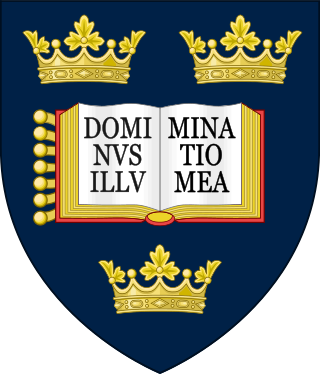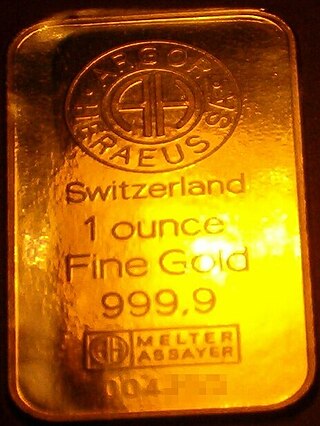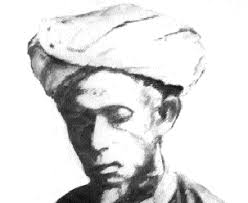
The University of Oxford is a collegiate research university in Oxford, England. There is evidence of teaching as early as 1096, making it the oldest university in the English-speaking world and the world's second-oldest university in continuous operation. It grew rapidly from 1167, when Henry II banned English students from attending the University of Paris. After disputes between students and Oxford townsfolk in 1209, some academics fled north-east to Cambridge where they established what became the University of Cambridge. The two English ancient universities share many common features and are jointly referred to as Oxbridge.

The Statue of Zeus at Olympia was a giant seated figure, about 12.4 m (41 ft) tall, made by the Greek sculptor Phidias around 435 BC at the sanctuary of Olympia, Greece, and erected in the Temple of Zeus there. Zeus is the sky and thunder god in ancient Greek religion, who rules as king of the gods of Mount Olympus.
A lakh (; abbreviated L; sometimes written lac) is a unit in the Indian numbering system equal to one hundred thousand (100,000; scientific notation: 105). In the Indian 2,2,3 convention of digit grouping, it is written as 1,00,000. For example, in India, 150,000 rupees becomes 1.5 lakh rupees, written as ₹1,50,000 or INR 1,50,000.

Troy weight is a system of units of mass that originated in 15th-century England and is primarily used in the precious metals industry. The troy weight units are the grain, the pennyweight, the troy ounce, and the troy pound. The troy grain is equal to the grain unit of the avoirdupois system, but the troy ounce is heavier than the avoirdupois ounce, and the troy pound is lighter than the avoirdupois pound. One troy ounce equals exactly 31.1034768 grams.

The Royal Mint is the United Kingdom's official maker of British coins. It is the oldest company in the United Kingdom and is currently located in Llantrisant, Wales, where it moved in 1968.
In heraldry, or is the tincture of gold and, together with argent (silver), belongs to the class of light tinctures called "metals". In engravings and line drawings, it is hatched using a field of evenly spaced dots. It is very frequently depicted as yellow, though gold leaf was used in many illuminated manuscripts and more extravagant rolls of arms.

Zari is an even thread traditionally made of fine gold or silver used in traditional Indian, Bangladeshi and Pakistani garments, especially as brocade in saris etc. This thread is woven into fabrics, primarily silk, to make intricate patterns and elaborate designs of embroidery called zardozi. Zari was popularised during the Moghul era; the port of Surat was linked to the Meccan pilgrimage route which served as a major factor for re-introducing this ancient craft in India.
In heraldry, azure is the tincture with the colour blue, and belongs to the class of tinctures called "colours". In engraving, it is sometimes depicted as a region of horizontal lines or else is marked with either az. or b. as an abbreviation.
The term azure shares origin with the Spanish word "azul", which refers to the same color, deriving from Hispanic Arabic lazawárd the name of the deep blue stone now called lapis lazuli. The word was adopted into Old French by the 12th century, after which the word passed into use in the blazon of coats of arms.

The Oxford University Ice Hockey Club (OUIHC) is home to the Men’s and Women’s Blues ice hockey teams of the University of Oxford, England. The Men's Blues, also known as Oxford University Blues, is one of the world's oldest ice hockey teams. Tradition places the origin of the team in 1885, when a match is said to have been played against Cambridge University Ice Hockey Club in St Moritz, Switzerland. This date is recognised by the Hockey Hall of Fame, and prior to the 1985 Ice Hockey Varsity Match, the International Ice Hockey Federation formally recognised the 1885 game as the first ice hockey match played in Europe. However, there is no contemporary evidence that this match took place, and Oxford now claims that this was a bandy match.
Mark Evans is a Canadian rower.

John Michael Evans is a Canadian technology executive and the President of Alibaba Group. He previously spent 20 years working for U.S. investment bank Goldman Sachs and is a former Olympic rower.

University College Boat Club is the rowing club for all members of University College, Oxford ("Univ").

The ancient Olympic Games were a series of athletic competitions among representatives of city-states and were one of the Panhellenic Games of Ancient Greece. They were held at the Panhellenic religious sanctuary of Olympia, in honor of Zeus, and the Greeks gave them a mythological origin. The originating Olympic Games are traditionally dated to 776 BC. The games were held every four years, or Olympiad, which became a unit of time in historical chronologies. They continued to be celebrated when Greece came under Roman rule in the 2nd century BC. Their last recorded celebration was in AD 393, under the emperor Theodosius I, but archaeological evidence indicates that some games were still held after this date. The games likely came to an end under Theodosius II, possibly in connection with a fire that burned down the temple of the Olympian Zeus during his reign.

Raja Ali Haji bin Raja Haji Ahmad (1808/9–1869/75) was a 19th-century Bugis-Malay historian, poet and scholar who wrote Tuhfal al-Nafis. He was elevated to the status of National Hero of Indonesia in 2004. Haji has been described as one of the most important Malay writers of the 19th century.
Bel-bani or Bēl-bāni, inscribed mdEN-ba-ni, “the Lord is the creator,” was the king of Assyria from c. 1700 to 1691 BC and was the first ruler of what was later to be called the dynasty of the Adasides. His reign marks the inauguration of a new historical phase following the turmoil of the competing claims of the seven usurpers who preceded him. He was the 48th king to appear on the Assyrian King List and reigned for ten years.

A minaudière is a women's fashion accessory, generally considered a jewellery piece, intended to substitute for an evening bag. A case with compartments, it allows storage for several items in a small space, such as a makeup compact, lipstick, watch, reading glasses, or keys.
The 139th Boat Race took place on 27 March 1993. Held annually, the Boat Race is a side-by-side rowing race between crews from the Universities of Oxford and Cambridge along the River Thames. Cambridge, using "cleaver blades" for the first time in the history of the race, won by 3+1⁄2 lengths in a victory that was described in The Times as "crushingly conclusive". The winning time of 17 minutes exactly was the fourth-fastest time in the event. In winning the event, Cambridge prevented Oxford making it seventeen wins from the last eighteen races and levelling the overall score for the first time since the 1929 race.
The 69th Women's Boat Race took place on 30 March 2014. The race, between crews representing Oxford University Women's Boat Club and Cambridge University Women's Boat Club, was umpired by Judith Packer. Cambridge's crew, the heavier of the two, was entirely British, while Oxford's boat included rowers from Canada, Switzerland and the United States. Oxford won by four lengths in a time of 5 minutes 50 seconds, their second consecutive win. The victory took the overall record in the event to 41–28 in Cambridge's favour. It was the last time the race would be conducted over a 2 km (1.2 mi) straight race as part of the Henley Boat Races.
The 68th Women's Boat Race took place on 24 March 2013. The race, between crews representing Oxford University Women's Boat Club and Cambridge University Women's Boat Club, was conducted as part of the Henley Boat Races. It took place on a 2 km (1.2 mi) stretch of water on 2012 Olympic venue Dorney Lake. Cambridge were the heavier of the crews and consisted of an all-British crew, while Oxford's boat included a Hungarian rower and an American cox. Oxford won the race by one and three-quarter lengths in a time of 7 minutes 11 seconds, their first win since the 2011 race. The victory took the overall record in the event to 41–27 in Cambridge's favour.
The 66th Women's Boat Race took place on 27 March 2011. The race was conducted as part of the Henley Boat Races and took place at Henley-on-Thames. Oxford won by one length in a time of 6 minutes 24 seconds, their fourth consecutive win. The victory took the overall record in the event to 40–26 in Cambridge's favour.










